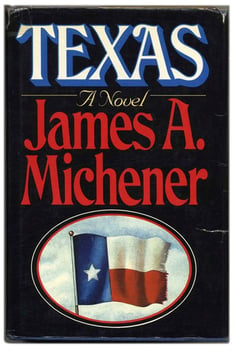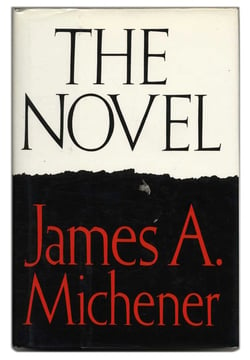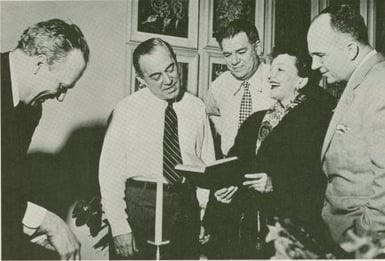1. Tales of the South Pacific
Michener is well known for this tome, and it won him his Pulitzer Prize. It was adapted for the stage as the Rodgers and Hammerstein musical South Pacific. The book is not only based on true facts of World War II, but also on his own experiences while stationed in the New Hebrides Islands. What makes this one such an enjoyable read is the engaging multiple characters and the riveting tales of human interaction across cultures.
2. Return to Paradise
If you loved Tales of the South Pacific, you’ll be glad to know that there is a sequel. Return to Paradise picks up where Tales of the South Pacific leaves off and is yet another collection of short stories that depict life in the South Pacific in the late 1940s: a great read and a welcome return to an evocative and exciting narrative.
3. The Bridges at Toko-Ri
Another of Michener’s novels to be made into a movie, this book details the Korean war and focuses on Navy pilots. Michener, himself, served as a United States Navy officer and writes a great deal of this novel from his professional experience. The film adaptation of the same name starred the iconic Grace Kelly and William Holden. This book has been hailed by actual veterans of the war as the most accurate portrayal of their personal experiences.
4. Hawaii
Published the same year that Hawaii became part of the United States, this novel shines a light on the series of inhabitants, cultures, and realities ingrained in the history of the islands called Hawaii. It starts before man, with the creation of the islands, and touches on immigrants, missionaries, natives, and finally “Golden Men” who represent the amalgamation of the different groups. This book pays homage to the territory we know, the islands as they were formed, and the many hands that helped to build and grow what Hawaii has become.
5. Texas
 The longest of Michener's books, this 1,076 page novel commanded a first printing of 750,000 copies. The numbers are all in line with a novel written about Texas, where everything is bigger. As his signature style commands, the book spans hundreds of years, and explores the history of the state in intimate ways while staying faithful to history. This massive tribute to Texas was not well received by critics, but it was made into a T.V. movie in 1994. The book is gigantic, detailed, and creates a new perspective on the Lone Star State, one deeply based on state archives and support from the government of Texas.
The longest of Michener's books, this 1,076 page novel commanded a first printing of 750,000 copies. The numbers are all in line with a novel written about Texas, where everything is bigger. As his signature style commands, the book spans hundreds of years, and explores the history of the state in intimate ways while staying faithful to history. This massive tribute to Texas was not well received by critics, but it was made into a T.V. movie in 1994. The book is gigantic, detailed, and creates a new perspective on the Lone Star State, one deeply based on state archives and support from the government of Texas.
6. Legacy
Another novel steeped in history, Legacy starts with a topical event, the Iran-Contra Affair, which was very recent in the minds of the American people when the book was published in 1987. Michener did not stay within that time frame, however. Instead, he used it as a backdrop to investigate and bring human perspective to a series of eras throughout history. In the book, Major Norman Starr is testifying before Congress on the Iran-Contra matter. Starr's fictional ancestors come into play as Michener allows us to visit the past, while providing context in the present. That the book itself is all written during the time of the Iran-Contra Affair makes this a primary/secondary source historic novel.
7. Space
Michener seems to leave history behind in this sci-fi sounding book, but it is another mash-up of reality and fiction. It stars a series of fictional characters who pick up their destinies in the true events of the 1940s, leaving behind the Korean War, and entering the new world of space exploration as it was over the next ten years and as it might have been for twenty more. Although the book sees four men travel to the moon and discusses the result of that mission, much of the book discusses political and social realities of the time. It ends with an examination of the inevitability of life outside of our awareness on earth. Although clearly a departure from some of his other work, Space provides an interesting perspective on what might have been and what may be yet to come.
8. Presidential Lottery
Presidential Lottery is a non-fiction account of what Michener saw as the true danger of our political system, the Electoral College. Michener was asked to be a presidential elector in Pennsylvania, and from that experience, he saw how futile, dangerous, and potentially damaging the current system was. He took it upon himself to deeply analyze and examine the process while working within it, and this book is a desperate plea to the American people to enact change.
9. The Novel
 Written in the early '90s, this work is decidedly meta. Instead of writing a historic novel, Michener writes about a man who writes historical novels. Although not necessarily autobiographical, this book discusses many literary devices that are later used in the novel itself. It does have the same general style as other Michener books in that it involves multiple viewpoints, characters, and the influence of the main event on their lives and perspectives. However, its focus on form, content, creation, and the writer instead of on a singular place or aspect of history is what sets it apart and makes it a must-read for Michener fans.
Written in the early '90s, this work is decidedly meta. Instead of writing a historic novel, Michener writes about a man who writes historical novels. Although not necessarily autobiographical, this book discusses many literary devices that are later used in the novel itself. It does have the same general style as other Michener books in that it involves multiple viewpoints, characters, and the influence of the main event on their lives and perspectives. However, its focus on form, content, creation, and the writer instead of on a singular place or aspect of history is what sets it apart and makes it a must-read for Michener fans.











